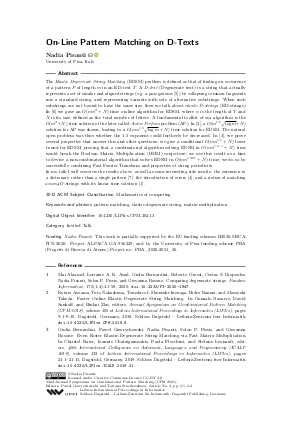On-Line Pattern Matching on D-Texts (Invited Talk)
Author
Nadia Pisanti 
-
Part of:
Volume:
32nd Annual Symposium on Combinatorial Pattern Matching (CPM 2021)
Part of: Series: Leibniz International Proceedings in Informatics (LIPIcs)
Part of: Conference: Annual Symposium on Combinatorial Pattern Matching (CPM) - License:
 Creative Commons Attribution 4.0 International license
Creative Commons Attribution 4.0 International license
- Publication Date: 2021-06-30
File

PDF
LIPIcs.CPM.2021.3.pdf
- Filesize: 416 kB
- 2 pages
Document Identifiers
Subject Classification
ACM Subject Classification
- Mathematics of computing
Keywords
- pattern matching
- elastic-degenerate string
- matrix multiplication
Metrics
- Access Statistics
-
Total Accesses (updated on a weekly basis)
0PDF Downloads0Metadata Views
Abstract
The Elastic Degenerate String Matching (EDSM) problem is defined as that of finding an occurrence of a pattern P of length m in an ED-text T. A D-text (Degenerate text) is a string that actually represents a set of similar and aligned strings (e.g. a pan-genome [The Computational Pan-Genomics Consortium, 2018]) by collapsing common fragments into a standard string, and representing variants with sets of alternative substrings. When such substrings are not bound to have the same size, then we talk about elastic D-strings (ED-strings). In [R.Grossi et al., 2017] we gave an O(nm²+N) time on-line algorithm for EDSM, where n is the length of T and N is its size, defined as the total number of letters. A fundamental toolkit of our algorithm is the O(m²+N) time solution of the later called Active Prefixes problem (AP). In [K.Aoyama et al., 2018], a O(m^{1.5} √{log m}+N) solution for AP was shown, leading to a O(nm^{1.5} √{log m}+N) time solution for EDSM. The natural open problem was thus whether the 1.5 exponent could furtherly be decreased. In [G.Bernardini et al., 2019], we prove several properties that answer this and other questions: we give a conditional O(nm^{1.5}+N) lower bound for EDSM, proving that a combinatorial algorithm solving EDSM in O(nm^{1.5-ε} +N) time would break the Boolean Matrix Multiplication (BMM) conjecture; we use this result as a hint to devise a non-combinatorial algorithm that solves EDSM in O(nm^{1.381}+N) time; we do so by successfully combining Fast Fourier Transform and properties of string periodicity. In my talk I will overview the results above, as well as some interesting side results: the extension to a dictionary rather than a single pattern [S.P.Pissis and A.Retha, 2018], the introduction of errors [G.Bernardini et al., 2020], and a notion of matching among D-strings with its linear time solution [M.Alzamel et al., 2020].
Cite As Get BibTex
Nadia Pisanti. On-Line Pattern Matching on D-Texts (Invited Talk). In 32nd Annual Symposium on Combinatorial Pattern Matching (CPM 2021). Leibniz International Proceedings in Informatics (LIPIcs), Volume 191, pp. 3:1-3:2, Schloss Dagstuhl – Leibniz-Zentrum für Informatik (2021)
https://doi.org/10.4230/LIPIcs.CPM.2021.3
BibTex
@InProceedings{pisanti:LIPIcs.CPM.2021.3,
author = {Pisanti, Nadia},
title = {{On-Line Pattern Matching on D-Texts}},
booktitle = {32nd Annual Symposium on Combinatorial Pattern Matching (CPM 2021)},
pages = {3:1--3:2},
series = {Leibniz International Proceedings in Informatics (LIPIcs)},
ISBN = {978-3-95977-186-3},
ISSN = {1868-8969},
year = {2021},
volume = {191},
editor = {Gawrychowski, Pawe{\l} and Starikovskaya, Tatiana},
publisher = {Schloss Dagstuhl -- Leibniz-Zentrum f{\"u}r Informatik},
address = {Dagstuhl, Germany},
URL = {https://drops.dagstuhl.de/entities/document/10.4230/LIPIcs.CPM.2021.3},
URN = {urn:nbn:de:0030-drops-139548},
doi = {10.4230/LIPIcs.CPM.2021.3},
annote = {Keywords: pattern matching, elastic-degenerate string, matrix multiplication}
}
Author Details
Funding
- Pisanti, Nadia: This work is partially supported by the EU funding schemes H2020-MSCA-ITN-2020. Project ALPACA GA 956229, and by the University of Pisa funding scheme PRA (Progetti di Ricerca di Ateneo) Project no. PRA_2020-2021_26.
References
- Mai Alzamel, Lorraine A. K. Ayad, Giulia Bernardini, Roberto Grossi, Costas S. Iliopoulos, Nadia Pisanti, Solon P. Pissis, and Giovanna Rosone. Comparing degenerate strings. Fundam. Informaticae, 175(1-4):41-58, 2020. URL: https://doi.org/10.3233/FI-2020-1947.
- Kotaro Aoyama, Yuto Nakashima, Tomohiro I, Shunsuke Inenaga, Hideo Bannai, and Masayuki Takeda. Faster Online Elastic Degenerate String Matching. In Gonzalo Navarro, David Sankoff, and Binhai Zhu, editors, Annual Symposium on Combinatorial Pattern Matching (CPM 2018), volume 105 of Leibniz International Proceedings in Informatics (LIPIcs), pages 9:1-9:10, Dagstuhl, Germany, 2018. Schloss Dagstuhl - Leibniz-Zentrum fuer Informatik. URL: https://doi.org/10.4230/LIPIcs.CPM.2018.9.
- Giulia Bernardini, Pawel Gawrychowski, Nadia Pisanti, Solon P. Pissis, and Giovanna Rosone. Even Faster Elastic-Degenerate String Matching via Fast Matrix Multiplication. In Christel Baier, Ioannis Chatzigiannakis, Paola Flocchini, and Stefano Leonardi, editors, 46th International Colloquium on Automata, Languages, and Programming (ICALP 2019), volume 132 of Leibniz International Proceedings in Informatics (LIPIcs), pages 21:1-21:15, Dagstuhl, Germany, 2019. Schloss Dagstuhl - Leibniz-Zentrum fuer Informatik. URL: https://doi.org/10.4230/LIPIcs.ICALP.2019.21.
- Giulia Bernardini, Nadia Pisanti, Solon P. Pissis, and Giovanna Rosone. Approximate pattern matching on elastic-degenerate text. Theor. Comput. Sci., 812:109-122, 2020. URL: https://doi.org/10.1016/j.tcs.2019.08.012.
- The Computational Pan-Genomics Consortium. Computational pan-genomics: status, promises and challenges. Briefings Bioinform., 19(1):118-135, 2018. URL: https://doi.org/10.1093/bib/bbw089.
- Roberto Grossi, Costas S. Iliopoulos, Chang Liu, Nadia Pisanti, Solon P. Pissis, Ahmad Retha, Giovanna Rosone, Fatima Vayani, and Luca Versari. On-Line Pattern Matching on Similar Texts. In Juha Kärkkäinen, Jakub Radoszewski, and Wojciech Rytter, editors, 28th Annual Symposium on Combinatorial Pattern Matching (CPM 2017), volume 78 of Leibniz International Proceedings in Informatics (LIPIcs), pages 9:1-9:14, Dagstuhl, Germany, 2017. Schloss Dagstuhl - Leibniz-Zentrum fuer Informatik. URL: https://doi.org/10.4230/LIPIcs.CPM.2017.9.
- Solon P. Pissis and Ahmad Retha. Dictionary Matching in Elastic-Degenerate Texts with Applications in Searching VCF Files On-line. In Gianlorenzo D'Angelo, editor, 17th International Symposium on Experimental Algorithms (SEA 2018), volume 103 of Leibniz International Proceedings in Informatics (LIPIcs), pages 16:1-16:14, Dagstuhl, Germany, 2018. Schloss Dagstuhl - Leibniz-Zentrum fuer Informatik. URL: https://doi.org/10.4230/LIPIcs.SEA.2018.16.
